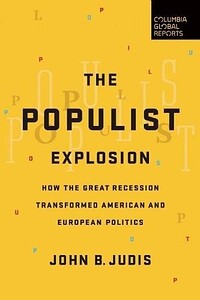Status
Collection
Publication
Description
Is the West witnessing a huge political upheaval? As if overnight, many Democrats revolted and passionately backed a socialist named Bernie Sanders; the United Kingdom voted to leave the European Union, in a stunning rebuke; the vituperative billionaire Donald Trump became the presidential nominee of the Republican Party; and a slew of rebellious parties continued to win election after election in countries like Switzerland, Norway, Italy, Austria, and Greece. John B. Judis tells us why we need to learn about the populist movement that began in the United States in the 1890s, the politics of which have recurred on both sides of the Atlantic ever since. Populism, on both the right and the left, champions the people against an establishment, based on issues -- globalization, free trade, immigration -- on which there has been a strong elite consensus, but also an even stronger mass discontent that is now breaking out in the open.… (more)
Media reviews
User reviews
This is a good quick read for anyone who wants to understand why Europeans are questioning the EU (Brexit), why Trump is popular, and how the two phenomena are related.
In his introduction, Judis explains
”Leftwing populists champion the people against an elite or an establishment. Theirs is a vertical politics of the bottom and middle arrayed against the top. Rightwing populists champion the people against an elite that they accuse of coddling a third group, which can consist, for instance, of immigrants, Islamists, or African American militants. Leftwing populism is dyadic. Rightwing populism is triadic. It looks upward, but also down upon an out group.”
Of the eight chapters, including the “Introduction” and the “Conclusion,” three are devoted to U.S. politics and three to European. I struggled a bit to keep up with the information presented in the chapter on Greece and Spain, with which I have only minimal familiarity (and also, the events in southern Europe seemed less relevant to the situation in the U.S., which is my main interest), but the populist movements in northern Europe, particularly Great Britain and France, turned out to be very interesting to me. The conflicts and concerns focusing on immigration in those countries, and the changing political allegiances and priorities of voters as a result of those worries, were unmistakeably familiar.
One “drawback” of this book is that, writing in 2016, the author is quite confident that Donald Trump will lose the election, and that Hillary Clinton will win. He then goes on to consider what what the two major parties will “learn” from their latest brush with populism. If only!
”How much this shift in debate will be reflected after the November election remains unclear. If Trump is soundly defeated, as seems likely at this writing, the Republican congressional and business leadership will argue that his defeat was due not only to his intemperate and amateurish campaigning, but to his populism. After Barry Goldwater was defeated in 1964, leading Republicans made similar arguments. But in the case of Goldwater, more polished imitators sprung up who eventually transformed the Republican Party. If Trump's campaign does spawn imitators, the Republicans will face a continuing conflict between its white working class and business supporters.
Sanders's campaign is likely to have a more certain impact on the Democratic Party even if he himself fades from the scene. Sanders's outlook is well represented in Congress by senators Elizabeth Warren and Sherrod Brown and by the House Progressive Caucus, which Sanders helped to found. If Hillary Clinton does win the presidency, they are likely to provide a counter-weight to the neoliberal influence of Wall Street and Silicon Valley among the Democrats. That should lead to continuing conflict within the party.
In the near term, however, the United States is not likely to experience a political earthquake that would overturn neoliberalism and realign the parties.”
Snort! With Trump now in the White House, amusing himself by taking pot shots at Republicans and Democrats with and equal opportunity viciousness and clearly promoting no one's interests but his own, this faith that the election would follow conventional expectations is sadly touching. Such are the risks of writing political books in an election year, I suppose. Still, the information on populism itself is still valuable.
I listened to this as an audiobook read by Coleen Marlo, and I do not recommend this format. She sounds like a robot, and I was only sure that a real person actually was reading the book because, especially early in the book, she mispronounces so many words. The worst was “Ku Klux Klan,” which she repeatedly reads as “Klu Klux Klan.” A robot wouldn't do that.
Reservations aside, this is a useful little book that covers a lot of ground and gave me a better understanding of a movement that seems likely to be part of our political landscape for a while to come.
